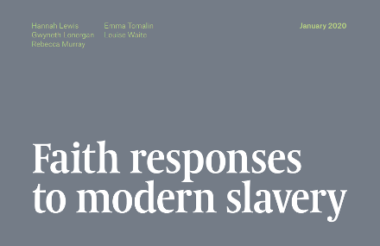Some faith-based organisations (FBOs) working on modern slavery responses de-emphasise their faith origins because they feel being overtly religious could limit funding partnership and other opportunities, according to a new report.
The findings form part of a three-year, ESRC-funded research project conducted between the Universities of Sheffield and Leeds. The report, Faith responses to modern slavery, focuses on the FBOs that support victims of modern slavery, finding that they represented around 30 per cent of that sector.
The report found that there is little evidence to suggest that FBOs promote religion to survivors of modern slavery, but that to be “overtly more religious” was considered to limit the employee recruitment pool and to be potentially off-putting to funders.
“Seeking influence in public debates, discourse and policy, implementing standards of care, and appearing attractive to a broad range of funders was felt to require a de-emphasis of faith in both internal practices, policies and interactions, and in mission, purpose and public communications,” the report reads.
Therefore, some faith-based organisations (FBOs) “appear as and operate as secular organisations in certain spaces”.
'Fear of proselytisation'
Researchers said that on the whole FBOs were not promoting religion to victims of modern slavery, but there is a fear that they do which can be harmful to relationships with other organisations.
Dr Hannah Lewis, senior research fellow at University of Sheffield and the project’s principal investigator, said: “We found little evidence that faith-based organisations are promoting religion to survivors of modern slavery. However, the fear of evangelising damages trust and partnership work in the anti-modern slavery sector.
“Publicly adopting and implementing the Human Trafficking Foundation’s Trafficking and Modern Slavery Survivor Care Standard on ‘Freedom of Belief, Religion and Thought’ would provide widespread reassurance to partners, service users and donors.”
'Many faith based organisations have very strong positions on non-proselytisation'
Dame Sara Thornton, independent anti-slavery commissioner, said: “This report highlights the significant and valuable contribution of faith-based organisations to modern slavery.
“I think the report goes a long way to reassure that in most instances, religion is not being promoted to the people being supported as victims and that many faith based organisations have very strong positions on non-proselytisation.”
The report found that not publicly displaying religion in organisation communications or in daily conversations with survivors was often considered an “integral part” of religious-based commitment to justice. Indeed, one member of staff rejected the idea that “personal religion should come into their ‘day job’ or matter in working alongside people of different faiths or none”.
FBOs operating on a 'dual register'
The report also found that FBOs may operate on a “dual register”. That is, they change how they communicate depending on the audience. When addressing religious audiences, they would change the way they speak to highlight their faith responses to modern slavery while for general public audiences FBOs “often conceal their religious base, origins or ethos in websites, reports, or funding applications”.
Researchers did not suggest that there is an inverse relationship between religiosity and professionalisation in practices or public communications. However, they found there was “an evident discomfort” among FBOs about being public about their faith identity.
|
Related Articles











